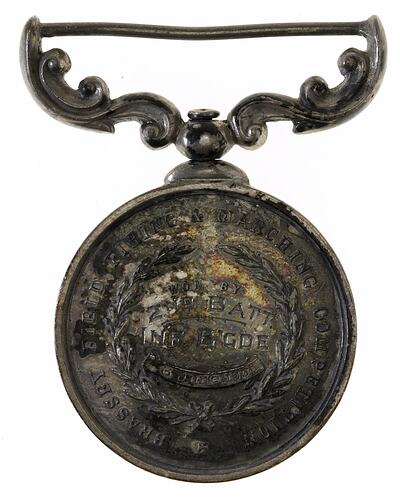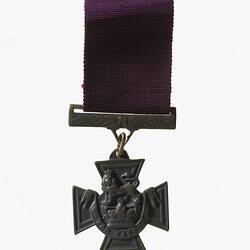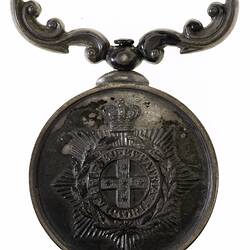George Henry (Harry) Wannenmacher was the sixth child of German immigrants Anna (Maria) Margaretha Krautzer and Johann Frederick Wannenmacher of Hamburg. Johann was a cooper and brewer who hoped to start a champagne industry near Sydney. They arrived in Sydney aboard the 'Daniel Ross' on 26 April 1855. George Henry was born the following year, on 18 March. The family moved to Melbourne before 1869, where his brother Gustav Lorenzo was born.
Tragically, Johann died on 9 March 1872, leaving Maria to care for six children aged 3 to 17. Fortunately the Melbourne German community provided her with the means to obtain a hotel licence. She became licencee of the Red Line Hotel in Lonsdale Street, then moved to the Liverpool Arms Hotel, Footscray, the Flagstaff Hotel, West Melbourne and finally the Guiding Star Hotel, again in Footscray. Her younger children were brought up in the hotel environment and had little formal education.
George Henry trained as a hairdresser. He married Matilda Hall White at St Mary's Church of England, West Melbourne, on 27 June 1887. He was 22 and she was 19. They initially ran a tobacconist shop in Ferguson Street, North Williamstown. In 1889 they moved to the hairdressing shop at the Grand Hotel (now the Windsor Hotel), and lived in rooms above. George was an insatiable collector of objects including medals, coins, guns, pistols, watches, maps and war memorabilia. However, his vices never extended to smoking or drinking alcohol.
Around 1900 he was dabbling in many entrepreneurial ventures, including printed postcards and film projection (he later sold his projectors to Mr Hoyts). He imported a street sweeping machine from Europe and other European goods. These ventures often required visits to Europe, including Germany, where he still had family, although he did not speak German.
George became a successful hairdresser, and it is said that he eventually restricted his work to the very best clients, including the Prime Minister. As a result of a careless remark about the confidence and skill of the German Army during World War I, he was interned, and found himself with prisoners of war from the German cruiser Emden. He cheerfully claimed the time was a holiday from his wife and her close friend. He was inspired to collect artifacts made by the Emden prisoners. When he was released he continued to add to his collections, and it all became too much for Matilda. She threw him out, and unknown to her he rented one of her houses in Fitzroy, where he set up his collections and gave shelter to needy men.
By 1923 George had a collection of more than 1,000 medals, many collected during his visits to Europe, China, Japan and America. He bought some from pawnbrokers, who sold them by weight in silver. Some of the medals had been pawned by desperate former soldiers. He sold them back to the soldiers at the price he paid, rather than make a profit. Other medals were given to him by grateful soldiers, including a Victoria Cross. He aimed to collect a further 200 medals, then to donate half to the Public Library and the other half to the War Museum.
In 1930 George fell and ruptured his bladder. He died on the operating table, aged 65. His funeral was held at the Melbourne Lutheran Church, and his coffin was covered with penny wreaths from the many old soldiers who he had befriended and assisted after World War I. His medal collection was bequested as planned. A receipt from the Public Library indicates the medals were donated on 23 May 1931. The medals later became part of Museum Victoria collection.
On June 25 1931 George's daughter Margareita Ashburner wrote to the National Gallery expressing anger that the value of the donation, 96 pounds 19/6-, had been published in the Argus on 29 May. She noted that the collection 'would be extremely difficult to value in cash terms, and, that this aspect should be stressed has caused me considerable pain and annoyance. To add to the annoyance a similar announcement was made several times from a broadcasting station. The publishing of the gift in such terms appears to reveal a lack of courtesy.'
References:
Information from Ashburner family member.
The Argus, 11 December 1923.
Museum Victoria records.
More Information
-
Keywords
-
Localities
-
Authors
-
Article types


